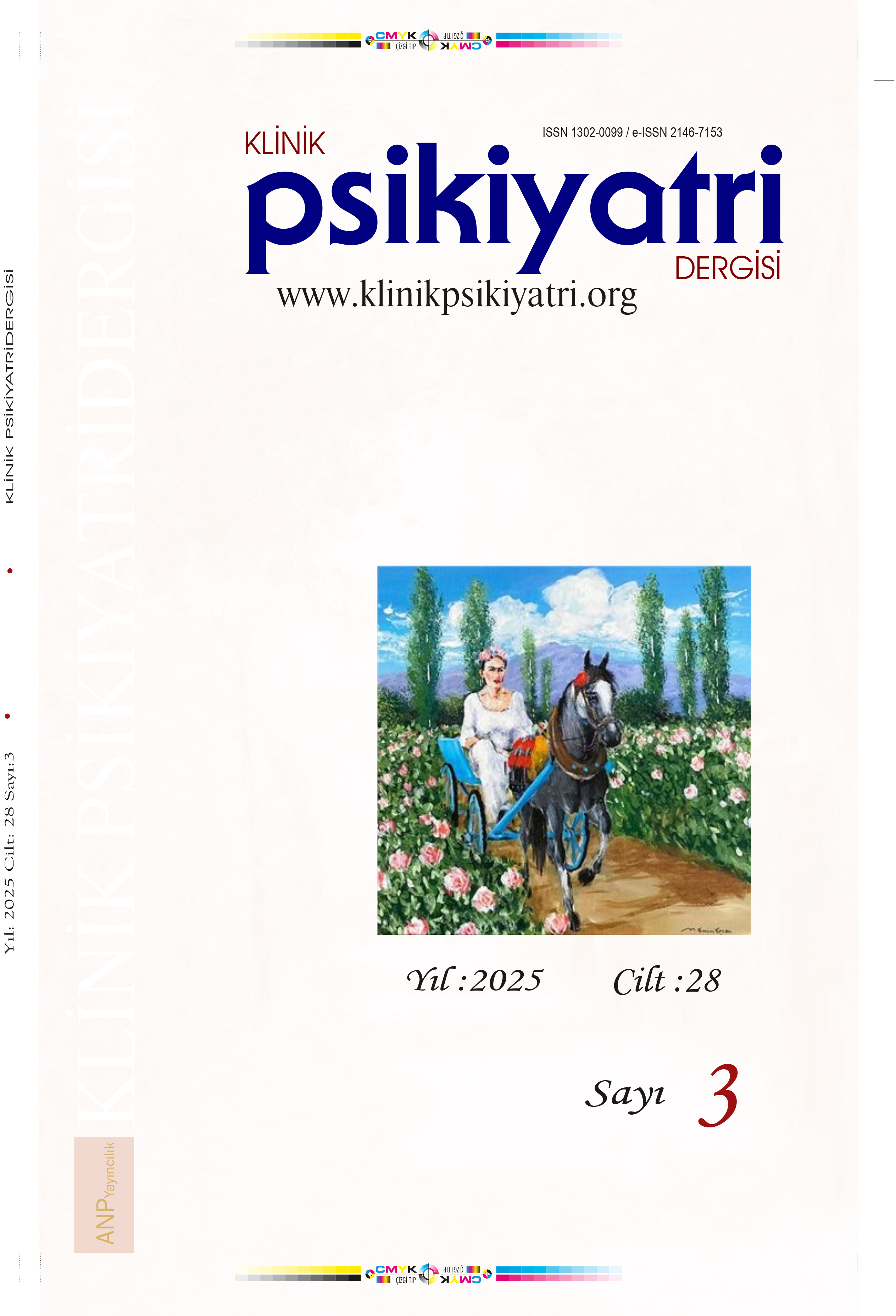




Afet Psikiyatrisi Polikliniğine Başvuranlarda Altı Aylık İzlem Çalışması: Depresyon, Anksiyete, Stres ve Psikolojik Dayanıklılık
Leman Deniz Tarlacık1, Ferdi Kosger1, Gülcan Güleç2, Çınar Yenilmez1, Rita Roncone3, Imran Gokcen Yilmaz Karaman11Eskişehir Osmangazi Üniversitesi, Tıp Fakültesi, Psikiyatri Anabilim Dalı, Eskişehir, Türkiye2Serbest Hekim, Eskişehir, Türkiye
3L Aquila Üniversitesi, Sağlık ve Çevre Bilimleri, Psikiyatri Birimi, L Aquila, İtalya
GİRİŞ ve AMAÇ: Depremler ve depremlerin sonuçları sosyal, ekonomik ve psikolojik zorluklarla ilişkilidir. Bu çalışmanın amacı, 6 Şubat 2023 depremlerinden 6 ay sonra Eskişehir Osmangazi Üniversitesi Afet Psikiyatri Polikliniği'ne (APP) başvuran kişilerin psikolojik stres ve psikolojik dayanıklılık düzeylerini değerlendirmek ve yordayıcıları gözden geçirmektir.
YÖNTEM ve GEREÇLER: Çalışmanın ilk aşamasında APP’ye başvuran bireylere uygulanmış olan sosyodemografik ve klinik veri formu kayıtları retrospektif olarak değerlendirilmiştir. Çalışmanın ikinci aşamasında ise katılımcılara depremden 6 ay sonra Depresyon Anksiyete Stres-21 Ölçeği (DASS-21) ve Kısa Psikolojik Sağlamlık Ölçeği (KPSÖ) uygulanmıştır.
BULGULAR: Araştırmanın ilk aşamasında 68 kişinin kayıtlarına ulaşılmış, ikinci aşamasına ise 42 kişi katılmıştır. Afetin 6. ayında katılımcıların %59,5'i depresyon alt ölçeğinden, %42,9'u anksiyete ölçeğinden ve %31'i stres ölçeğinden orta ve üzerinde puan almıştır. İlk değerlendirme sırasındaki Klinik Global İzlenim Ölçeği (KGİ) puanları, anksiyete alt ölçek puanı ve toplam DASS-21 puanı ile korelasyon göstermiştir. İlk uygulamadaki KGİ skoru takipteki psikolojik sağlamlık skoru ile negatif yönde ilişkiliydi. KPSÖ skoru toplam DASS-21 skoru ile negatif korelasyon göstermiştir.
TARTIŞMA ve SONUÇ: Afet sonrası dönemde psikososyal destek sağlanması, ruhsal bozuklukların önlenmesi ve psikolojik sağlamlığın artırılması için önemlidir. Ayrıca, riskli grupların belirlenmesi ve bu kişilerin takip ve tedavi süreçlerinin takibi, ilişkili morbiditeyi azaltmak için önemli bir faktördür.
Anahtar Kelimeler: afetler, depremler, ruh sağlığı hizmetleri, psikolojik sıkıntı, dirençlilik
Follow-Up Findings from a Disaster Psychiatry Clinic: Depression, Anxiety, Stress, and Resilience Six Months After a Major Earthquake
Leman Deniz Tarlacık1, Ferdi Kosger1, Gülcan Güleç2, Çınar Yenilmez1, Rita Roncone3, Imran Gokcen Yilmaz Karaman11Eskişehir Osmangazi University, Faculty of Medicine, Department of Psychiatry, Eskişehir, Turkey2Private Practice, Eskişehir, Turkey
3University of L Aquila, Health and Environmental Sciences, Department of Life, Unit of Psychiatry, L Aquila, Italy
INTRODUCTION: Earthquakes and their consequences are associated with social, economical, and psychological difficulties. This study aimed to evaluate the psychological stress and psychological resilience levels of people who applied to Eskişehir Osmangazi University Disaster Psychiatry Outpatient Clinic (DPOC) 6 months after the February 6, 2023 earthquakes and to review the predictors.
METHODS: In the first phase of the study, the sociodemographic and clinical data form records applied to the individuals who applied to DPOC were retrospectively evaluated. In the second phase of the study, the participants were applied the Depression Anxiety Stress-21 Scale (DASS-21) and the Brief Psychological Resilience Scale (BRS) 6 months after the earthquake.
RESULTS: In the first phase of the research, 68 people were included and 42 of them participated in the second phase. In the 6th month of the disaster, 59.5% of the participants scored moderate or higher on the depression subscale, 42.9% on the anxiety scale, and 31% on the stress scale. Clinical Global Impression Scale (CGI) scores during the first evaluation correlated with the anxiety subscale score, total DASS-21 score. CGI score at the first application was negatively related to resilience score in follow-up. BRS score was negatively correlated with total DASS-21 score.
DISCUSSION AND CONCLUSION: Providing psychosocial support in the post-disaster period is important to prevent mental disorders and increase psychological resilience. Also, identifying risky groups and monitoring the follow-up and treatment processes of these individuals is an important factor to reduce the associated morbidity.
Keywords: disasters, earthquakes, mental health services, psychological distress, resilience
Makale Dili: İngilizce
(185 kere indirildi)











